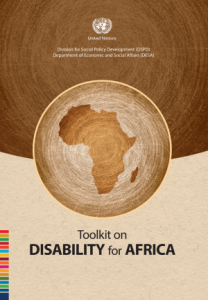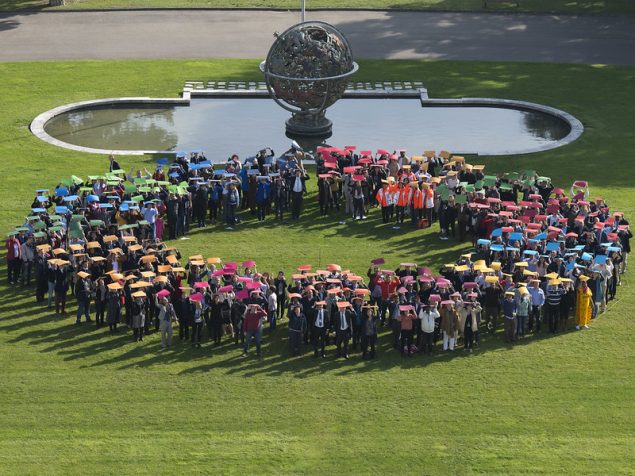In order for a person using a wheelchair to access decent work, the person needs to be able to physically move in and out of his or her home; needs to be able to access the public space and transportation; and needs to be able to access the work facilities, in terms of both the built environment and its information and communications systems.
Different entities need to ensure that their respective spheres of responsibility provide the necessary opportunities and access to persons with disabilities, on an equal basis with others. If any one element of the network fails in this obligation, persons are not able to reap the benefit from the other elements. In order for them to be integrated and included in the development agenda, a comprehensive and holistic approach is required. Mainstreaming disability in development or disability-inclusive development is a useful and necessary strategy.
There is a strong bidirectional link between poverty and disability. Poverty may cause disability through malnutrition, poor healthcare, and dangerous living conditions. Case studies in developing countries show that higher disability rates are associated with higher rates of illiteracy, poor nutritional status, lower immunization coverage, lower birth weight, higher rates of unemployment and underemployment, and lower occupational mobility. Disability can cause poverty by preventing the full participation of persons with disabilities in the economic and social life of their communities, especially if the appropriate supports and accommodations are not available.
The Millennium Development Goals (MDGs) established a unifying set of developmental objectives for the global community. Bringing together United Nations agencies, governments and civil society around eight key development issues, the MDGs foster collaborative action to reduce poverty, improve health and address educational and environmental concerns around the world’s most pressing development problems. The MDGs are specifically designed to address the needs of the world’s poorest citizens and the world’s most marginalized populations.
The high numbers of persons with disabilities who are disproportionately represented among the world’s most marginalized groups have a profound significance with respect to the achievement of the MDGs, which thus far seems to have gone largely unnoticed in the international discourse on the Goals. Eighty per cent of persons with disabilities live in developing countries, and the failure to include and integrate them in all development activities will mean failure to achieve the MDGs.
Furthermore, given the wide scope of contexts, actors and activities required to fully include persons with disabilities in the development agenda, it may be helpful to consider the process in the light of the “no-gap policy”. The no-gap policy is a concept which illustrates that no entity, whether it be part of the United Nations system, a Government ministry or a non-governmental organization (NGO), can achieve the goal of equality for persons with disabilities on its own. Rather, an interconnected network of actors is required to reach this goal.
Increased access to data and statistics will increase the ability to ensure that programmes are targeting the areas of greatest need. The development and dissemination of such data, as well as knowledge including good practices, lessons learned, and sources of expertise, will assist all actors in the implementation of the Convention on the Rights of Persons with Disabilities at the local, national and international levels. The integral involvement of civil society, including of organizations of persons with disabilities, in national and international mechanisms is an essential ingredient in effectively guiding the development agenda towards integrating and including persons with disabilities. Efforts to incorporate and include persons with disabilities into the development activities have been gaining momentum over the past several decades.
The Convention on the Rights of Persons with Disabilities offers an ideal opportunity to consolidate disability-related activities, and to develop policies and structures that ensure that persons with disabilities are mainstreamed within the United Nations system. Lessons learned from gender and HIV/AIDS mainstreaming can provide valuable guidance, and there are an increasing number of tools to inform and guide this process, which when coupled with strong political will can lead to significant positive gains.
Furthermore, the Convention on the Rights of Persons with Disabilities also provides the opportunity for human rights and development actors to actively combine and integrate these two areas. New and innovative thinking and collaboration are required to utilize the Convention so as to bring the maximum benefit to persons with disabilities and society. It is both a human rights and a development instrument that elucidates how all categories of rights apply to persons with disabilities, and identifies practical measures to create development programmes that are inclusive of, and accessible to, persons with disabilities.
Resources and documents
UN Expert Group Meeting on a disability inclusive development agenda towards 2015 and beyond, UNDESA and UNU (Kuala Lumpur, Malaysia, 2 to 4 May 2013)
Publication: Best practices for including persons with disabilities in all aspects of development efforts
“Mainstreaming disability in the development agenda” Note by the Secretariat to the Forty-sixth session of the Commission for Social Development to the, 6-15 February 2008 (E/CN.5/2008/6)
Panel Discussion: Mainstreaming Disability in the Development Agenda, United Nations Headquarters, 12 February 2008
Disability Dimension in Development Action: Manual on Inclusive Planning United Nations in collaboration with the National Research and Development Centre for Welfare and Health (STAKES) in Finland (Revised online version 2003)
Barclays launches Return on Disability ETNs
Incheon Strategy to “Make the Right Real” for Persons with Disabilities in Asia and the Pacific, United Nations Economic and Social Commission for Asia and the Pacific (UNESCAP), Bangkok, November 2012




